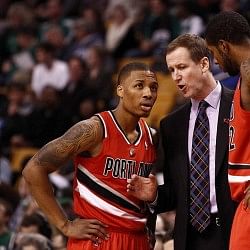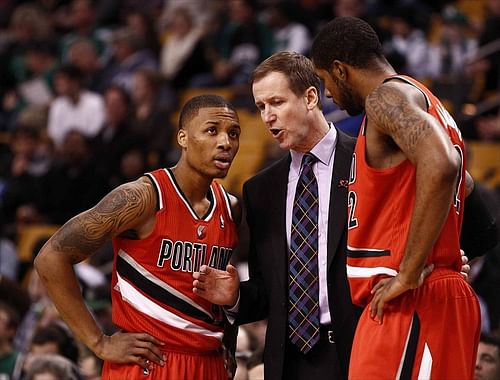
The rise of Damian Lillard and the Portland Trail Blazers

Damian Lillard, at the epicentre of the Portland Trail Blazers’ resurgence
Throughout the history of the NBA, the draft lottery has played a tremendous role in making or breaking a franchise. Indeed, for small market teams bereft of all the glitz and glamour that franchises like the Los Angeles Lakers and the New York Knicks have to offer, landing a franchise-changing superstar in free agency is about as long a shot as winning the NBA championship with a sub-par roster.
It is common knowledge that if a team wants to contend in the NBA it needs to have at least one All-Star calibre player, which results in the drafting of young talent from across the globe and a nursing of feverish hope that the player drafted develops and brings all the anticipation to fruition. The amount of scouting and speculation that goes into a single draft is preposterous, and all of it has a singular aim – to acquire a player that can pull the franchise out of mediocrity, into the bright lights that the playoffs offer.
But the history of the draft lottery is bleak at best. Ever since the inception of the current structure of the draft lottery, there have been more bust No. 1 draft picks than potential superstars. Poor judgement, over-valuation of a prospect, plain bad luck, or sometimes, a combination of all three, can result into any young and raw player falling from the heights of draft stock into NBA nothingness. The NBA is a make or break league and the rigours of the NBA are something that few players are able to deal with. Keeping all this in mind, the idea of losing a season just to get a higher draft pick and a bigger piece of the pie is hardly foolproof.
Moreover, putting so much faith in the basketball gods can be a tricky concept; just ask the Miami Heat, who came off a horrendous season only to see the first pick that they so rightfully deserved by virtue of one of the worst regular season records in the NBA till that point, go to Chicago Bulls who had approximately 1.8% chance of snagging the No. 1 pick. Chicago drafted Derrick Rose and Miami drafted Michael Beasley. One player blossomed, giving Chicago the next face for its franchise and basically ushering the Point Guard era of the league, and the other joined a long list of young NBA players who failed to live up to their draft hype.
As painful and time-consuming rebuilding is for fans to watch, it is something every team in the NBA has to deal with at some point or the other. Whether it is because of the superstar of the team retiring or wanting to play elsewhere, rebuilding is inevitable. Smart moves like the ones Oklahoma City Thunder have made can instantly transform a lottery team into a contender. The Thunder have basically provided a blue-print of how to build your team through the draft, and their moves have been copied throughout the league now, by every team, with the exception of the Brooklyn Nets hoarding first round draft picks like never before.
The recent success of the Portland Trail Blazers brings this debate to the forefront once again. The Blazers are perhaps the worthy recipients of ‘the biggest draft blunder in NBA history’ award with their ill-fated decision to draft Sam Bowie ahead of Michael Jordan. What followed might be the subject of a new article; however, the Blazers have come a long way since then.
The Blazers historically have always been good. Since the days of Clyde Drexler, who is seen as a reason for not drafting Michael Jordan in the first place, the Blazers have been a good team. But therein lies the problem; being just good does not cut it in the NBA. Mediocrity is a curse for any NBA franchise, since it is not bad enough to land a top pick and not good enough to win the title.
Brandon Roy was a superstar until his injuries got the better of him. His demise finally turned the Blazers from mediocre to abysmal. Even with players like LaMarcus Aldridge and Nick Batum in tow, the Blazers could barely muster enough gas to win anything.
Getting a No. 6 pick in the Anthony Davis sweepstakes in 2012, the Blazers drafted a young precocious point guard by the name of Damian Lillard, and that started the upward transformation. In the 2012-2013 season the Blazers won, but could not win enough to get past the defiant Lakers who were on a mission of their own and were determined to sneak into the playoffs. Still, nobody failed to notice the young point guard at the helm who held his own through games which featured the best in the league. Whether it was matching Chris Paul’s nifty crossovers or going toe to toe with Kobe Bryant in the closing moments of the game, Lillard showed poise and talent that were far removed from what you would expect an NBA rookie just learning the ropes of the new world that he is thrust in to display. He won the Rookie of the Year award over Anthony Davis, the No. 1 pick who had a heck of a season in his own right.
Fast forward to the 2013-2014 season and the Blazers have finally put the ‘mediocre’ tag behind them. Their achievements have been a little overshadowed by the Phoenix Suns who are redefining the concept of over-achievement, but the Blazers have been having one of their best seasons till date. LaMarcus Aldridge has been having a breakout season and Wesley Matthews has become one of the most feared three point shooters in the league.
But none of them have showed the improvement that Damian Lillard has. In his sophomore year, Lillard has shown composure beyond the level you’d expect from a player just one year removed from his rookie days. He’s been at the fore front in almost all the Blazer victories this season, dishing out assists or slithering his way to the basket with the utmost ease. Damian Lillard has been one of the most clutch players this season, a quality that we generally relate to a savvy veteran and not a sophomore. A quality that has been the defining trait of nearly every legitimate superstar since the early days of the game.
The Blazers are one of the top four teams in a stacked Western conference. They still have work to do though, because in spite of their offensive exploits on the court, they are pretty bad at defence, ranking 19th in opponent field goal percentage, something that should crease Terry Stott’s forehead since they are vying for the top spot in the Western conference. The fast-paced Blazers offence may win them games in the regular season, but they will face problems when the playoffs start since the pace of the game slows down considerably and the offence becomes more static.
Whether the Blazers win any silverware this season or not is up for debate, but for all the Blazer fans out there, this season is a sign of better things to come in the subsequent years. The blueprint for a championship is there and so is the superstar. It is just a matter of time and execution.